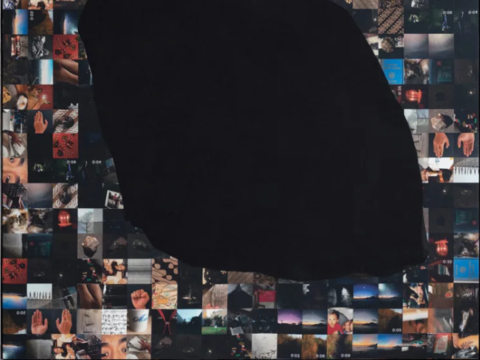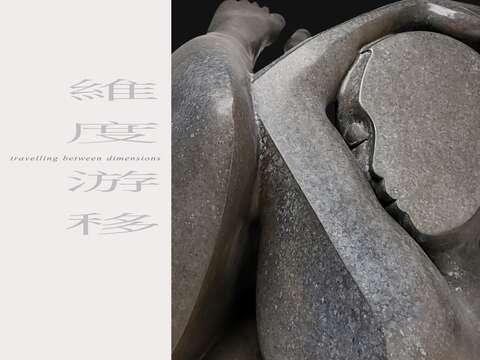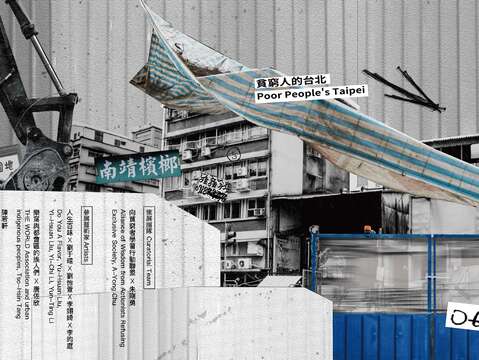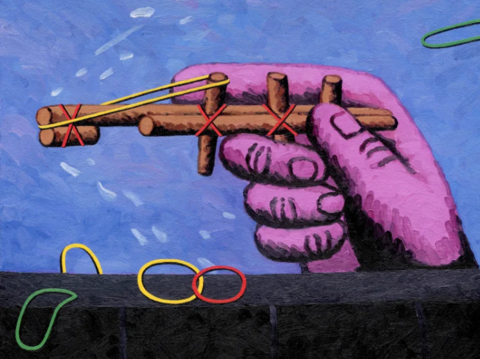Post date:2024-04-19
Updates:2024-04-19
63

- Event Time
- 2024-04-13~2024-05-04Tue. - Sat. 14:00- 19:00
- Event Location
- No. 1, Lane 86, Xinming Road,, Neihu Dist., Taipei City Taiwan, R.O.C
In ‘Titik Dari’ which means points of from, Sebastianus questions the locality of ‘belonging’ within the memories of our past and how we make sense of the varying dimensions it can take form. Alexander Sebastianus Hartanto ritualizes the act of recalling a memory through intertwining two generational methods of memory keeping; photography and batik, a Javanese wax-resist dye technique. These works, which the artist describes as ‘studies’, investigate the shape of ‘being’, its many layers, and its constitution. Pixelated image-particles, representative of memories and belongings, are imprinted on cloth and waxed over, before the cloth is then dipped into dye. This batik process is an apt metaphor for recalling, recovering, and unveiling, as the wax holds the initial image imprinted onto the fabric, resisting the dye that otherwise shrouds the rest of the textile in darkness. Sebastianus utilizes craft as a transformative method of contemplation that allows us to materialize and meditate on our unconscious.
In his search for points of from, Sebastianus references philosophers Deleuze and Guattari’s notion of the rhizome, a non-hierarchical sprawl of various roots, shoots, and possible trajectories, always open to interconnection and entanglement with others. These studies, meta-morphed the sediments of our memories that we’ve accumulated into the cosmological plane of a cloth. Enabling us to form a unitary body/rock composed of particles in millions, a material that we can mold and sculpt into monuments of our forms.
Alexander Sebastianus Hartanto (b.1995), artist, writer, and ethnographer based in Java and Bali. Hartanto’s works explores the decontextualization of material cultures and how it is perceived, understood and ritualized in practice. His manifesto reclaims the practice of Sani, a way of living which involves offering, service and search of the unknown, in opposition to Seni or Kunst/Art. A recreation of pilgrimages, sacred spaces, ritual studies and woven cloths are products of Hartanto’s continuing practice, et al. The works and experiences of Sani may or may not be archived, documented or shared. What's left are remnants and evidence of materials that takes place in Sani.
Prior to his comparative art studies, Hartanto was an apprentice for a Javanese master weaver, in East Java. He was awarded the William Daley Award for Excellence in Art History and a Craft Field, 2017 and the Massachusetts College of Art & Design: Fiber Arts Departmental Honors, 2018. He has exhibited works in ArtJakarta 2020-2022, Art SG 2022, and ArtTapei 2023 and the upcoming S.E.A Focus 2024, Singapore. He teaches craft practice & theory and design ontologies to Artisans in Java, Bali and the United States. Hartanto currently works as a textile craft school developer and ethnographer at Rumah Sukkha Citta in Java.
In his search for points of from, Sebastianus references philosophers Deleuze and Guattari’s notion of the rhizome, a non-hierarchical sprawl of various roots, shoots, and possible trajectories, always open to interconnection and entanglement with others. These studies, meta-morphed the sediments of our memories that we’ve accumulated into the cosmological plane of a cloth. Enabling us to form a unitary body/rock composed of particles in millions, a material that we can mold and sculpt into monuments of our forms.
Alexander Sebastianus Hartanto (b.1995), artist, writer, and ethnographer based in Java and Bali. Hartanto’s works explores the decontextualization of material cultures and how it is perceived, understood and ritualized in practice. His manifesto reclaims the practice of Sani, a way of living which involves offering, service and search of the unknown, in opposition to Seni or Kunst/Art. A recreation of pilgrimages, sacred spaces, ritual studies and woven cloths are products of Hartanto’s continuing practice, et al. The works and experiences of Sani may or may not be archived, documented or shared. What's left are remnants and evidence of materials that takes place in Sani.
Prior to his comparative art studies, Hartanto was an apprentice for a Javanese master weaver, in East Java. He was awarded the William Daley Award for Excellence in Art History and a Craft Field, 2017 and the Massachusetts College of Art & Design: Fiber Arts Departmental Honors, 2018. He has exhibited works in ArtJakarta 2020-2022, Art SG 2022, and ArtTapei 2023 and the upcoming S.E.A Focus 2024, Singapore. He teaches craft practice & theory and design ontologies to Artisans in Java, Bali and the United States. Hartanto currently works as a textile craft school developer and ethnographer at Rumah Sukkha Citta in Java.
Related Links
Gallery
:::
 TITIK DARI:CONSTELLATIONS OF FROM
TITIK DARI:CONSTELLATIONS OF FROM








